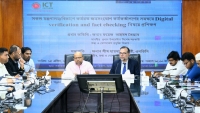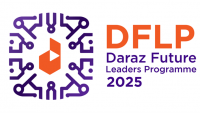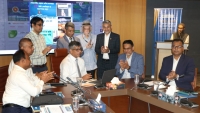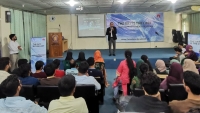
সোমবার ● ১ জুলাই ২০১৩
প্রথম পাতা » English » Activists Demands Enactment of Data Privacy to Protect Citizens Rights
Activists Demands Enactment of Data Privacy to Protect Citizens Rights
A public dialogue on ‘Challenges of Privacy and Security in Bangladesh: Perspective from Human Rights Defenders’ was held on Sunday, 30 June 2013 at the CIRDAP Auditorium, Dhaka. The dialogue was organized by VOICE in association with Law Life Culture, Bangladesh Manobadhikar Sangbadik Forum; Bangladesh ICT Journalist Forum, Campaign on Citizen Right to Information; Equity and Justice Working Group; Online Knowledge Society, Sushashoner Jonno Procharavijan (SUPRO); School of Communications and Cultural Metaphysics. Eminent leaders and journalists including Khushi Kabir, Women Leader, and Coordinator of Nijera Kori; Mahmdur Rahman Manna, Politician, Saiful Haque, general secretary of The Revolutionary Workers Party, Dr. Shahriar Rahman of Asia Pacific University spoke in the panel among others.
The panelists discussed the issues of privacy, national security and along with the existing institutional practices on legal and policy regulations to rise with the human rights framework. They also discussed the recent criminalization of right to freedom of expression and privacy and raised on how to build a broader constituency creating capacity and strengthening networking through raising voices to uphold privacy rights being critical on communication surveillance in Bangladesh.
Farjana Akter, programme coordinator of VOICE discussed key points referring the principles of communication surveillance while she raised that surveillance in the internet and social networking hamper the right to privacy and freedom of speech. Any restrictions put upon the networking sites must have legal bindings, she argued.
Rezaur Rahman excutive director of Law Life Culture in his presentation said that the constitution of Bangladesh doesn’t categorically guarantee the right to privacy as a fundamental right. Since Article 43 limited in application and is subjected to ‘reasonable restrictions imposed by law in the interests of the security of the State, public order, public morality or public health’. Several other provisions –articles 11, 31 and 32 –can constructively be interpreted to extend the ambit of the right to privacy. On the other hand the Supreme Court of the country has not yet got any notable opportunity to offer such an interpretation. He emphasized to undertake regulatory measures to protect citizens’ right to privacy.
Saiful haq said that the Bangladesh Parliament on 11 June 2013 passed the Anti-Terrorism (Amendment) Bill 2013 which would allow the Courts to accept videos, still photographs and audio clips used in Facebook, twitter, Skype, and other social media for trial cases. Under this amendment the police officer concerned will immediately inform the District Magistrates about the occurrence of a crime that come under the purview of this Act and files cases against the persons or entity or foreign national. He also said “When the Anti-Terrorism Ordinance was first promulgated by the military-backed Caretaker Government in 2007, we raised concerns regarding its potential for abuse, which proved to be true as we have witnessed a trend of persistent criminalisation of popular dissents and the tendency to reduce complex social, economic, political and cultural grievances into a purely criminal matter.
Mahmudur Rahman Manna said that the democratic space is being used by the youth very proactively that signifies the strengthend role in the society expressing free speech. However, he argued, social values are deteriorating and urged the online users to maintain standards of human rights principles in blogging and facebooking. He also demanded that government should undertake policy measures so that democratic norms are uphold and no one is being harassed for online activities. He raised concerns that privacy should be maintained along with the other rights, however, government also should take measures to protect its citizens from cyber crime.
Khushi Kabir said criminalization of opinions expressed online and offline through social media or blogs, is not only a violation of freedom of expression and the right to privacy; it also represents a new pattern of persecution of any voice of cyber dissidents, as well as human rights defenders and whistleblowers.” The violation of the constitutional right as well as privacy rights actually shirks the democratic space in the society. We cannot only address our concern abstractly in moral, ethical, legal or juridical terms but must act on what concrete changes need to take place and simultaneously, emergency intervention to respond to the current crises (external & internal) which effect victims quality of life, livelihood and dignity.
Ahmed Swapan Mahmud, Executive Director, VOICE while moderate the session emphasized for new enactment of the privacy and data protection laws to secure personal data and the classified data for state sovereignty.
Khairuzzaman Kamal, executive director of BMSF, Prodip Kumar Roy, chief executive of Online Knowledge Society, Md. Kawsar Uddin, Ex-President of Bangladesh ICT Journalists Forum, Shariful Islam from Supro and Mostafa Kamal Akanda from Equitybd spoke on the event among others.





 The Invisible Backbone: Why Bangladesh is falling behind in the Internet Revolution
The Invisible Backbone: Why Bangladesh is falling behind in the Internet Revolution  Applications for the 2025 APNIC Fellowship program are now open
Applications for the 2025 APNIC Fellowship program are now open  We work together with Bangladesh Community to move IPv6 adoption forward: Jia Rong
We work together with Bangladesh Community to move IPv6 adoption forward: Jia Rong  Signing Ceremony of MoU Between BIGF & ISOC Bangladesh
Signing Ceremony of MoU Between BIGF & ISOC Bangladesh  TMGB members’ children receive scholarships and educational materials
TMGB members’ children receive scholarships and educational materials  Tariqul Islam Joins WEJHA as General Manager
Tariqul Islam Joins WEJHA as General Manager  APRICOT 2025 will be held in Malaysia
APRICOT 2025 will be held in Malaysia  Global Brand Private Limited Introduced Lenovo IdeaPad Pro 5i Laptop
Global Brand Private Limited Introduced Lenovo IdeaPad Pro 5i Laptop  ServicEngine Limited won the “National Export Trophy” for consecutive tenth times
ServicEngine Limited won the “National Export Trophy” for consecutive tenth times 







